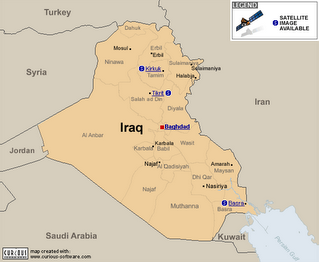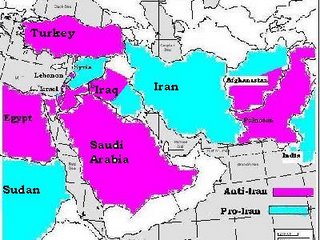Things just got a whole lot worse for ordinary Iraqis, and maybe the whole world.
Bush's USA looks set to back a strongarm Shiite government in Baghdad, and now Saudi Arabia is preparing "financial" (i.e. military) backing for the Sunni minority:
One Arab diplomat in Washington said: "If things become so bad in Iraq, like an ethnic cleansing, we will feel we are pulled into the war." ...Well, that explains why the Saudi Ambassador abruptly resigned and left Washington yesterday. Behind the scenes, things seem to be moving quickly.
In its policy review, the [Bush] Administration is focusing on the "80 per cent solution", which would bolster the political centre of Iraq and in effect leave in charge the Shiite and Kurdish parties that won elections a year ago and account for 80 per cent of Iraq's 26 million people.
I saw this Daily Kos story when I woke up at 4:30 am this morning (I thought it would be top story on the TV news but it's still not even front paging at Kos). The map is all the evidence you need to see how Iraq is set to become the sandwich between Shiite-dominated Iran and Sunni-dominated Saudi Arabia.

Some folk are criticizing Bush for putting off his response to the Iraq Study Group recommendations until January, claiming his lack of engagement at this critical time is unpardonable. But I think it is actually a reflection of how sidelined Bush the Cheerleader has become, and just how volatile the situation in Iraq now is.
Make no mistake: international diplomacy is racing ahead on multiple fronts, many of the ISG recommendations were already being implemented before they were announced, and all parties concerned are desparately searching for a way out of the impasse. The best thing Bush can do right now is STFU.
Juan Cole is talking about a New Middle East Cold War: Saudi/Israel/Lebanon versus Iran/Syria/Iraq/Hizbullah. His map of a potential regional conflagration is even more terrifying:

Cole points out that Saudi millionaires are already funding Sunni guerrillas in Iraq. He says the fact that Saudi leaders are leaking stories like this to the New York Times suggests "their hair must be on fire with anxiety".
Meanwhile, a de facto Israeli-Saudi alliance appears to be building against Iran and the Shiites... I have been told that the Israeli leadership is extremely anxious about Iran becoming a nuclear power, and sullen about the outcome of the Lebanon war. They are further demoralized by the Baker-Hamilton Commission report, which calls for US talks with Iran. The Israeli leaders interpret this passage as a surrender by Washington to Iran's nuclear ambitions, and are preparing for the possibility that they might have to take on Iran themselves...Read Cole's full post for more analysis.
Saudi Arabia is equally frantic about the possibility of a nuclear Iran, and is moreover apoplectic that the US delivered Baghdad into the hands of Iraqi Shiite fundamentalists allied with Iran...
Israel, Jordan, Saudi Arabia and (de facto) the 14 March Bloc in Lebanon are ranged against Iran, Shiite Iraq, Syria, Hizbullah and Hamas. Neither Israel nor Saudi Arabia can openly admit to the tacit alliance for fear of anger from their own publics because of objectionable parties to it. But this is how things are shaking out.
Now the Saudis are openly saying that this new Cold War in the region could turn hot. If you don't own a bicycle, I'd buy one, because a regional war of the sort Saudi Arabia said it feared would potentially cut off 20 percent of the world's petroleum.
What's the bright side? Well, if there is one, it is that we can HOPE AND PRAY that such a major realignment in the Middle East might lead to a real solution to the Palestinian tragedy, as all sides involved realize they too much to lose from all-out military engagement. But that's far from certain at this stage. (And, of course, if such a miracle solution did somehow unfold, you can be sure Bush and the Neocons would immediately take full credit for bringing it about).
UPDATE: Pepe Escobar keeps it real:
There can be no firm timeline for a complete US withdrawal because it all depends on Iraq's new oil law being passed and US troops being able to defend Big Oil's investment.Escobar comes to much the same conclusions as Cole (above), but sees another potential player who could swing the game:
Once again, it's the oil. The Bush-Cheney system by all accounts went to Iraq to grab those fabulous reserves. The only way for an overall solution to the Iraqi tragedy would be for the Bush administration to give up the oil - with no preconditions, turning the US into an honest broker. Realpolitik practitioners know this is not going to happen.
The crucial development in the next few weeks is Muqtada's fine-tuning of a stunning Shi'ite counterpunch to demolish once and for all the US-created pro-sectarian strategy: a nationalist, pan-Islamist, anti-occupation coalition of the Sadrists and the neo-Ba'athists, plus any other religious or secular anti-occupation group.Oil was the real reason why the USA went into Iraq, and you can bet those big oil reserves will now become a major motivation for all the other players involved. There needs to be a wholesale agreement that the oil belongs to the Iraqi people, whatever their tribal or religious affiliations, and everybody else - Big Oil included - needs to just walk away. Can they do it? The alternatives are not pretty, with or without a regional solution to the Palestinian's plight.
Transcending the Sunni/Shi'ite divide, this would preempt any threat of all-out civil war - not to mention decide the fierce Shi'ite family feud between Hakim and Muqtada in the Sadrists' favor. No wonder US Senator John McCain wants to "take out" Muqtada as much as the Pentagon does...
The neo-conservative hallucination of a puppet Iraqi regime as the centerpiece of a US-driven Greater Middle East - loads of cheap oil, Israel-friendly, anti-Iran - may have been derailed by a Mesopotamian sandstorm. But even with the defeat of the occupation, the US - or "the snake", as Muqtada defines it - still is not going anywhere. The "snake" will redeploy. Sunni Arab US ally/client regimes fear that a US withdrawal would lead to a whole new regional ball game tilting toward pro-Iran or pro-al-Qaeda regimes.
Not even a long-drawn civil war - Arabs killing one another - may save Bush and Cheney. And Iraq won't succumb to "divide and rule" and break up - because its identity as the eastern flank of the Arab nation is a geopolitical fact. So the real tragedy is how much longer millions of Iraqis caught in the crossfire will be paying with their own blood for the United States' cataclysmic folly.
UPDATE 2: Professor Sadiq Wasfi and his daughter Dahlia put things in a more hopeful perspective:
The divisions between the Sunni and Shia sects of Islam are more than 1400 years old, and throughout that history, there has never been armed warfare between them until U.S. forces invaded. It is American forces who are directing and arming the Iraqi police and army, and it is American forces who by law are responsible for maintaining law and order. The Iraqi police are largely composed of militiamen from the private armies of former CIA operatives Ahmed Al-Chalabi (Iraqi National Congress), Iyad Allawi (Iraqi National Accord), and Nuri Al-Maliki (Hezb’Dawah). There are also Iraqi Police Commando Units—aka death squads—who are being trained by American Special Forces...UPDATE 3: Joshua Holland has more. He suggests the violence in Iraq should be seen in terms of Persian versus Arab, rather than Sunni versus Shiite.
The recently released report of the Iraq Study Group echoes the military assessment that the status quo in Iraq is hopeless. But their proposals are non-starters, since our history of occupation in the Arab World from Palestine to Iraq shows our bias for outside interests and our lack of credibility to take part in negotiations. The time for diplomacy was March 2003. After the death and utter destruction that “liberation” has brought to Iraq, we have no choice but to exit and exit now.
Our obligation to the people of Iraq, to the people of America, and to the rest of the world is the immediate and unconditional withdrawal of troops and mercenaries (including over 100,000 mostly U.S. private contractors) from Iraq. Ideally, a large multi-national force that excludes all neo-colonialist European countries should be created to establish law and order—a job we failed to do—and disarm the aforementioned militias within the context of a political consensus. A new Iraqi government will emerge as it has historically following centuries of invasions of Mesopotamia, likely comprised of representatives whose groups are now vying for power. We are responsible for bringing chaos and atrocity to Iraq. It is up to Iraqis—and Iraqis alone—to shape their future.
No comments:
Post a Comment